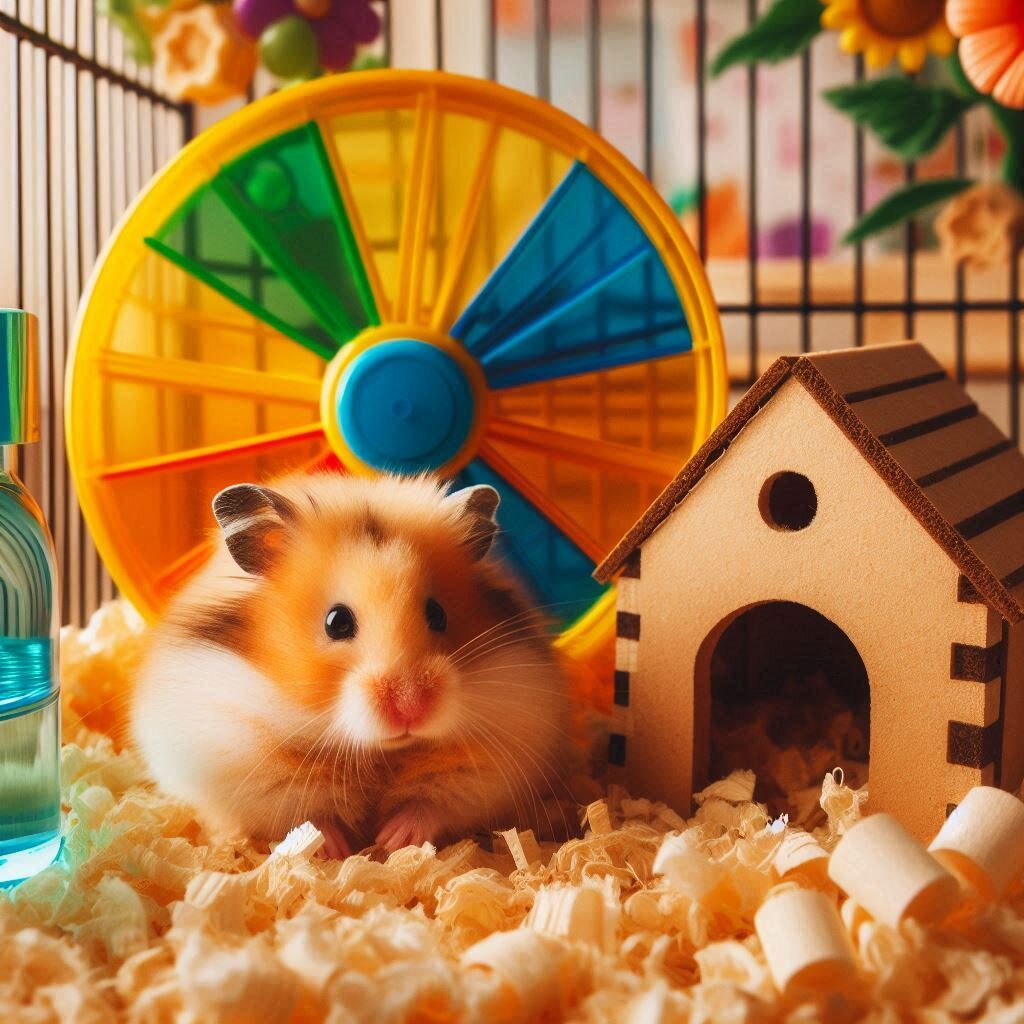Table of Contents
How Long Do Hamsters Live? Hamsters are tiny, endearing creatures that quickly become cherished members of the family. Their playful nature, compact size, and relatively low maintenance make them ideal pets, especially for first-time pet owners. However, as with any pet, understanding the lifespan of a hamster and the factors that contribute to it is crucial for providing the best care possible. In this article, we’ll explore how long hamsters typically live, what affects their lifespan, and the best practices to ensure your hamster lives a long, healthy, and happy life.
How Long Do Hamsters Live?
Average Lifespan of Different Hamster Species
Hamsters may all belong to the same rodent family, but their lifespans can vary significantly depending on their species. Understanding the typical lifespan of your hamster’s breed can help you better care for them throughout their life.
Syrian Hamsters
Syrian hamsters, also known as Golden or Teddy Bear hamsters, are the largest and most popular hamster species kept as pets. On average, a Syrian hamster lives between 2 to 3 years, although with exceptional care, some can reach up to 4 years.
Dwarf Hamsters
Dwarf hamsters are smaller and include species such as the Campbell’s Dwarf, Winter White, and Russian Dwarf hamsters. How Long Do Hamsters Live? Their lifespan tends to be shorter than that of Syrian hamsters, usually ranging from 1.5 to 2 years, though some have been known to live slightly longer.
Roborovski Hamsters
Roborovski hamsters are the smallest of all pet hamsters, and they have the longest lifespan among them. These energetic little creatures can live anywhere from 3 to 3.5 years, with some living up to 4 years if provided with optimal care.
Chinese Hamsters
Chinese hamsters, while less common as pets, have a lifespan similar to that of Dwarf hamsters. They typically live around 2 to 3 years, with good care potentially extending their life to about 3.5 years.
Factors Influencing Hamster Lifespan
Several factors can influence how long your hamster will live. While genetics plays a crucial role, external factors such as diet, environment, and mental well-being are equally important.
Genetics
Just like in humans, genetics play a significant role in determining a hamster’s lifespan. Some hamsters may be genetically predisposed to certain health conditions that could shorten their lifespan, while others may have genes that help them live longer.
Diet
A well-balanced diet is one of the most critical factors in extending your hamster’s lifespan. How Long Do Hamsters Live? Hamsters require a diet rich in fresh fruits, vegetables, grains, and specially formulated hamster pellets to meet their nutritional needs. Overfeeding or offering an unbalanced diet can lead to obesity and other health issues that can shorten your hamster’s life.
Environment
The environment your hamster lives in can have a significant impact on their lifespan. A clean, spacious, and safe cage, free from drafts and extreme temperatures, is essential. Additionally, providing a quiet and stress-free environment helps prevent health issues related to stress.
Exercise
Regular exercise is vital for a hamster’s physical health. How Long Do Hamsters Live? Hamsters are naturally active creatures, and providing them with opportunities to run, climb, and explore helps keep them fit and prevents obesity, a common issue that can shorten their lifespan.
Stress and Mental Health
Mental well-being is often overlooked but is crucial for a hamster’s overall health. Hamsters can suffer from stress and anxiety, which can lead to physical health problems and a shorter lifespan. Ensuring your hamster has a safe and enriching environment helps maintain their mental health.
Best Practices for Prolonging Your Hamster’s Life
Now that we’ve covered the factors that influence a hamster’s lifespan, let’s dive into the best practices you can follow to help your furry friend live as long as possible.
Providing a Balanced Diet
A healthy diet is the cornerstone of a long life for your hamster. Knowing what to feed them and what to avoid is essential for their well-being.
Recommended Foods
Hamsters thrive on a diet of high-quality hamster pellets that are specifically formulated to meet their nutritional needs. Fresh vegetables like carrots, spinach, and cucumbers, as well as fruits like apples and pears, can be offered in moderation. Whole grains and seeds, such as sunflower seeds and millet, also make great additions to their diet.
Foods to Avoid
While hamsters enjoy a variety of foods, there are some items you should never feed them. How Long Do Hamsters Live? Avoid giving your hamster citrus fruits, onions, garlic, and chocolate, as these can be toxic. Additionally, fatty, sugary, or overly processed foods should be kept out of their diet to prevent obesity and other health issues.
Creating a Safe and Comfortable Habitat
Your hamster’s home environment plays a huge role in their quality of life and lifespan. How Long Do Hamsters Live? A well-designed habitat will keep them happy and healthy.
Cage Size and Layout
A spacious cage is vital for a hamster’s well-being. The cage should be large enough to allow your hamster to explore, with separate areas for sleeping, eating, and playing. Aim for a minimum size of 360 square inches of floor space, with a multi-level cage being even better.
Bedding Choices
Choosing the right bedding is crucial for your hamster’s comfort and health. Opt for unscented, dust-free bedding made from paper or aspen shavings. Avoid cedar and pine bedding, as these can cause respiratory issues.
Toys and Enrichment
Hamsters are curious creatures that need mental stimulation to stay happy. Provide a variety of toys, such as chew sticks, tunnels, and climbing structures, to keep your hamster entertained and mentally active. Rotate toys regularly to keep their environment interesting.
Ensuring Regular Exercise
Hamsters are energetic and need plenty of exercise to stay healthy. Providing the right tools and opportunities for exercise is essential. How Long Do Hamsters Live?
Importance of Physical Activity
Physical activity is crucial to prevent obesity, which can lead to a shorter lifespan. Ensure your hamster has plenty of opportunities to run and play every day.
Wheel Size and Type
A wheel is a staple in any hamster cage, but it’s important to choose the right size and type. The wheel should be large enough for your hamster to run comfortably without arching their back. Solid wheels are preferred over wire ones to prevent injury.
Outside-the-Cage Playtime
Allowing your hamster time outside the cage to explore in a safe, controlled environment is a great way to give them extra exercise. A hamster ball or a secure playpen can be used to let them explore without the risk of getting lost or injured.
Common Health Issues in Hamsters and How to Prevent Them
Despite your best efforts, hamsters can still face health challenges. Knowing the common health issues and how to prevent them can help you take action early.
Respiratory Infections
Respiratory infections are common in hamsters, How Long Do Hamsters Live? often caused by poor cage hygiene or exposure to drafts. Signs include sneezing, wheezing, and discharge from the nose or eyes. Keeping the cage clean and in a draft-free area can help prevent these infections.
Dental Problems
Hamsters’ teeth grow continuously, which can lead to dental problems if they don’t have enough to chew on. Provide plenty of chew toys and hard foods to help wear down their teeth naturally.
Skin and Fur Issues
Mites, fungal infections, and allergies can cause skin and fur problems in hamsters. Regularly check your hamster’s fur for signs of bald spots, scabs, or excessive scratching. How Long Do Hamsters Live? If you notice any of these signs, consult a vet for appropriate treatment.
Tumors and Cancers
Unfortunately, hamsters are prone to developing tumors, especially as they age. Regular vet check-ups can help catch tumors early. While not all tumors are cancerous, they should be monitored closely by a vet.
Signs Your Hamster Might Be Aging
As your hamster gets older, How Long Do Hamsters Live? you’ll notice changes in their behavior and physical appearance. Recognizing these signs early can help you adjust their care to keep them comfortable.
Behavioral Changes
Older hamsters often become less active and may sleep more than they did in their younger days. They may also become less interested in toys or exploring.
Physical Signs of Aging
You may notice your hamster’s fur becoming thinner or grayer as they age. They might also lose weight, even if their diet hasn’t changed. Their movements might become slower, and they might have trouble with activities that were once easy for them.
How to Make Your Aging Hamster Comfortable
To help your aging hamster live comfortably, How Long Do Hamsters Live? make small adjustments to their environment. Lower their food and water dishes so they don’t have to climb, provide softer bedding, and ensure their cage is easily accessible without having to navigate difficult obstacles.
When It’s Time to Say Goodbye
One of the hardest parts of having a pet is saying goodbye. Knowing the signs that your hamster is nearing the end of their life can help you prepare emotionally and ensure they are comfortable in their final days.
Recognizing End-of-Life Signs
Signs that your hamster may be nearing the end of their life include extreme lethargy, refusal to eat or drink, labored breathing, and a general decline in physical condition. If you notice these signs, it’s important to make your hamster as comfortable as possible.
Providing Comfort During Final Days
As your hamster approaches the end of their life, provide them with extra comfort. How Long Do Hamsters Live? Keep their environment calm and quiet, offer soft foods that are easy to eat, and handle them gently to avoid causing stress or discomfort.
Coping with the Loss of a Pet Hamster
Losing a pet, even a small one like a hamster, can be heartbreaking. It’s important to give yourself time to grieve and remember the joy your hamster brought into your life. Consider creating a small memorial or writing about your experiences with your hamster as a way to honor their memory.
Conclusion
Hamsters may have short lifespans, How Long Do Hamsters Live? but the joy they bring to our lives is immeasurable. By understanding the factors that influence their lifespan and following best practices for their care, you can help ensure your hamster lives a long, happy, and healthy life. Remember, each day with your hamster is a gift, and by providing them with the best care possible, you’re giving them the best chance at a full and enriching life.
FAQs
How can I tell if my hamster is in pain?
Signs of pain in hamsters include reduced activity, loss of appetite, hunching, and vocalizations like squeaking. If you suspect your hamster is in pain, consult a vet immediately.
What is the best diet to increase my hamster’s lifespan?
A balanced diet of high-quality hamster pellets, fresh vegetables, fruits, and whole grains is the best way to support your hamster’s health and increase their lifespan.
How often should I clean my hamster’s cage?
You should clean your hamster’s cage at least once a week, with spot cleaning done daily to remove soiled bedding and food.
Can hamsters live longer in pairs or alone?
Syrian hamsters should always be kept alone, as they are solitary animals. Dwarf hamsters can sometimes live in pairs or groups, but it’s crucial to monitor for any signs of aggression. The key to a longer life is minimizing stress, whether they are housed alone or with others.
What is the most common cause of death in hamsters?
The most common causes of death in hamsters include old age, tumors, and respiratory infections. Providing a clean environment, a balanced diet, and regular vet check-ups can help prevent some of these issues.



Leave a Reply